
A record number of people are signing up for government programs designed to make student loan payments more affordable, according to data released Monday — but student loan defaults have also hit a record high.
The Education Department figures are a sign that while the government's loan repayment and forgiveness programs are finding a receptive audience, they are struggling to reach the country's neediest student loan borrowers, who keep tipping into default.
Instead, some critics say, the income-based repayment and forgiveness programs — which modify monthly loan payments according to income level — are being used primarily by graduate students and others who could already afford to repay their loans.
"It seems like people who would really benefit from this, in terms of getting help to not default on their loans — the federal government is still having a hard time reaching those students," said Robert Kelchen, an assistant professor of higher education at Seton Hall University.
The number of people enrolled in the government's income-based repayment programs jumped 36% over last year, the data showed, the largest increase of any quarter. But despite that surge, the number of people in default ticked up steadily — as it has every quarter since 2014 — standing at 20.6% of borrowers in the federal portfolio.
"In a world with income-based repayment, nobody should be defaulting on their loans," Kelchen said.
The average loan balance of borrowers enrolled in income-based repayment is more than $50,000, meaning those who have completed bachelor's or even graduate degrees. Those who are going into default tend paradoxically to have far lower loan balances, of $10,000 or even $5,000 — the result of half-finished degrees or low-level certificate courses at community and for-profit colleges. A study last year found that at Iowa community colleges, those who borrowed the least were the most likely to default on their loans.
"Once people are in default, they tend to stay in default," said Jason Delisle, a resident fellow at the American Enterprise Institute, a conservative think tank. The government, Delisle said, "hasn't really come up with a plan or solution. I don't see anyone really working on that."
One hurdle to enrolling borrowers in income-based repayment plans is the hefty amount of paperwork the government requires. That can be compounded by obstacles put in place by the government's student loan servicers, according to a report released last week by the Consumer Financial Protection Bureau, which found that student loan servicers did not do enough to get borrowers into plans like income-based repayment.
"Generally, when you look at the profile of somebody who is defaulting, it's probably someone who can't do a lot of time-consuming paperwork," said Delisle. "It's people who don't have time, who have lost track of things."
